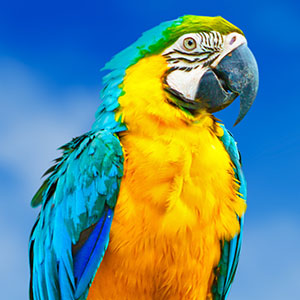
Macaws
What's up, my funky feathered friends! I'm Penny. I'm so excited to co-author this article about a very special kind of parrot: the marvelous, majestic macaw! The minions think I'm biased, so some scientific type human is gonna give you "the facts," but I'll chime in with the real deal on what makes macaws the wonder of the avian world.
Fast Facts
Lifespan: 30-50 years or more, depending upon quality of careSize: Smallest – Red-shouldered macaw at 12 – 14 inches
Largest – Hyacinth macaw at about 3 feet
Native to southern North America, Central America and South America
Endangered Status: varies among species from Least Concern to Vulnerable, Endangered and Extinct
Physical Characteristics
All the world's a stage when you're a magnificent macaw! With our show-stopping plumage and runway-worthy beak-sprecions, we're #modelstatus all the way. Forget catwalkin' – we're birdwalkin', baby! – PAs Penny mentioned, macaws are perhaps most famous for their appearance. Many species of macaw are named for their coloring: the Blue and Gold, Scarlet, Green-throated and Golden-collared macaws among them. While these brilliant hues make macaws stand out in the human world, among the bright leaves, fruits and flowers of their natural forested habitats, their coloring provides great camouflage.
In addition to their distinctive plumage, macaws' tongues, beaks and faces are unique.
- Macaw tongues are dry and scaly and have a bone inside that helps the macaw dig into fruits and veggies.
- Macaws have strong, prominent beaks which let them crack nuts and seeds, forage for food and groom one another (and show the minions who's boss! Ha! – P).
- The characteristic white patches on some macaws' faces aren't just feathers; they're mostly bare, pale skin patterned with tiny feathers. Like a human fingerprint, no two macaws share the same facial feather pattern.
Behavior in the Wild
You make it sound like we're just some fancy feathers with a nice beak! Give us SOME credit for our brains, lady! – PSmart and social, macaws rank among the most intelligent birds and often live together in families and flocks of 10-30 in the wild. These groups eat, sleep and travel together, sometimes flying many miles from their roosting site searching for food. They broadcast their big personalities to anyone listening, often screaming loudly to communicate with or recognize other flock members, mark their territory or intimidate predators or intruders.
Flocks of wild macaws in the western Amazon region sometimes land on river banks and eat the damp dirt and clay. While there are a number of theories about this behavior, its cause remains unknown. Some scientists hypothesize that the damp dirt contains minerals and chemicals that help settle the macaws' stomachs after they eat unripe fruit. Others posit that the clay contains vital levels of sodium that the birds, living far from the ocean, often lack.
Macaws mate for life, and these bonded pairs often groom one another in addition to roosting, flying and raising chicks together.
As Pets
Yeah yeah, that's enough about my bizzarro extended family! What about us crazy 'caws who have to keep both pinning eyes on you silly humans? I can't believe I even signed on for this job! Though the perks are pretty nice.... Minion, pass the dried papaya! – PAs you can probably tell from Penny's vivacious input, macaws retain their big personalities even when they live with people. These birds need very large cages so that they have plenty of room to move around and spread their wings. Stimulating foraging toys and perches with varied textures and widths are also essential for these smart cookies. However, even a big cage with plenty of great toys can't replace out-of-cage time with their favorite people. Macaws' natural intelligence and family/flock orientation make regular interaction and play essential. Without these vital connections, macaws resort to shrieking and harmful behaviors such as feather-picking.
In captivity, macaws still rock their alpha-bird sounds, so if you're considering adopting one, remember: your life is about to get A LOT noisier! Frequent screaming, though confusing to humans, is a perfectly normal behavior for macaws. The destruction of anything wooden or even mildly interesting is also normal for macaws. Trying to punish your bird for bad behavior will only alienate and confuse him, so use positive reinforcement with treats to encourage good behavior. Remove valuables from macaw-reach, and be prepared for daily shrieking bouts from your new friend.
But if your life is ready for gregarious Green-wing or a hot-shot Hyacinth, you'll have a BFF for life. These birds can learn tricks as well as words and grow to appreciate the affection of their favorite people. Some macaw parronts swear their feather babies have sarcastic or dry senses of humor and enjoying playing jokes on their human friends. If your hum-drum life needs A LOT of pizzazz, being a macaw parront could be just the wild ride for you!
Discover More!
My First Bird: What Kind of Bird Should I Get?Training Your Bird to Stop Screaming
Providing Your Bird with Intellectual Stimulation
How to Prevent Boredom in Your Bird
Penny's 2018 Holiday Wish List
Return to Bird Articles


